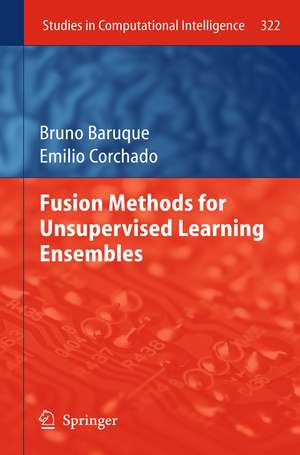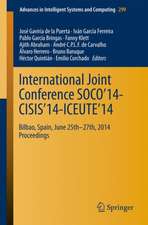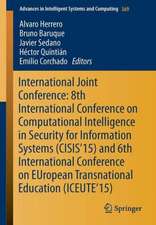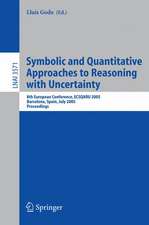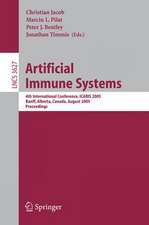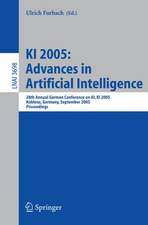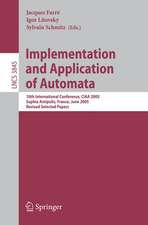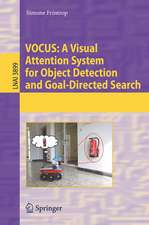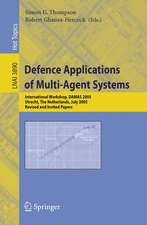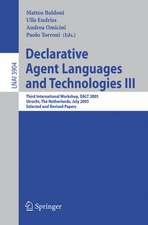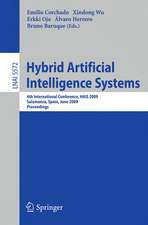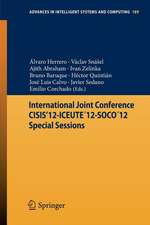Fusion Methods for Unsupervised Learning Ensembles: Studies in Computational Intelligence, cartea 322
Autor Bruno Baruqueen Limba Engleză Paperback – 11 oct 2014
| Toate formatele și edițiile | Preț | Express |
|---|---|---|
| Paperback (1) | 633.06 lei 6-8 săpt. | |
| Springer Berlin, Heidelberg – 11 oct 2014 | 633.06 lei 6-8 săpt. | |
| Hardback (1) | 639.35 lei 6-8 săpt. | |
| Springer Berlin, Heidelberg – 23 noi 2010 | 639.35 lei 6-8 săpt. |
Din seria Studies in Computational Intelligence
- 20%
 Preț: 449.37 lei
Preț: 449.37 lei - 20%
 Preț: 1158.26 lei
Preț: 1158.26 lei - 20%
 Preț: 986.66 lei
Preț: 986.66 lei - 20%
 Preț: 1452.76 lei
Preț: 1452.76 lei - 20%
 Preț: 168.78 lei
Preț: 168.78 lei - 18%
 Preț: 1112.30 lei
Preț: 1112.30 lei - 20%
 Preț: 565.38 lei
Preț: 565.38 lei - 20%
 Preț: 649.28 lei
Preț: 649.28 lei - 20%
 Preț: 1047.73 lei
Preț: 1047.73 lei - 20%
 Preț: 1578.96 lei
Preț: 1578.96 lei - 20%
 Preț: 643.50 lei
Preț: 643.50 lei - 20%
 Preț: 657.49 lei
Preț: 657.49 lei - 20%
 Preț: 993.28 lei
Preț: 993.28 lei - 20%
 Preț: 990.80 lei
Preț: 990.80 lei - 20%
 Preț: 989.96 lei
Preț: 989.96 lei - 20%
 Preț: 1165.69 lei
Preț: 1165.69 lei - 20%
 Preț: 1444.52 lei
Preț: 1444.52 lei - 20%
 Preț: 1041.96 lei
Preț: 1041.96 lei - 20%
 Preț: 1047.73 lei
Preț: 1047.73 lei - 20%
 Preț: 1046.06 lei
Preț: 1046.06 lei - 18%
 Preț: 2500.50 lei
Preț: 2500.50 lei - 20%
 Preț: 989.13 lei
Preț: 989.13 lei - 20%
 Preț: 1165.69 lei
Preț: 1165.69 lei - 20%
 Preț: 1164.05 lei
Preț: 1164.05 lei - 20%
 Preț: 1042.79 lei
Preț: 1042.79 lei - 20%
 Preț: 1460.19 lei
Preț: 1460.19 lei - 18%
 Preț: 1403.52 lei
Preț: 1403.52 lei - 18%
 Preț: 1124.92 lei
Preț: 1124.92 lei - 20%
 Preț: 1039.47 lei
Preț: 1039.47 lei - 20%
 Preț: 1008.11 lei
Preț: 1008.11 lei - 20%
 Preț: 1045.25 lei
Preț: 1045.25 lei - 20%
 Preț: 1275.42 lei
Preț: 1275.42 lei - 20%
 Preț: 1040.32 lei
Preț: 1040.32 lei - 20%
 Preț: 988.32 lei
Preț: 988.32 lei - 20%
 Preț: 1169.79 lei
Preț: 1169.79 lei - 20%
 Preț: 1162.37 lei
Preț: 1162.37 lei - 20%
 Preț: 1059.26 lei
Preț: 1059.26 lei - 20%
 Preț: 1164.05 lei
Preț: 1164.05 lei - 20%
 Preț: 1166.52 lei
Preț: 1166.52 lei - 20%
 Preț: 1459.38 lei
Preț: 1459.38 lei - 18%
 Preț: 1005.74 lei
Preț: 1005.74 lei - 20%
 Preț: 997.38 lei
Preț: 997.38 lei - 20%
 Preț: 1055.94 lei
Preț: 1055.94 lei - 20%
 Preț: 1284.47 lei
Preț: 1284.47 lei - 20%
 Preț: 994.08 lei
Preț: 994.08 lei - 20%
 Preț: 1048.72 lei
Preț: 1048.72 lei - 20%
 Preț: 1066.02 lei
Preț: 1066.02 lei - 20%
 Preț: 943.78 lei
Preț: 943.78 lei - 20%
 Preț: 1173.10 lei
Preț: 1173.10 lei - 20%
 Preț: 1457.72 lei
Preț: 1457.72 lei
Preț: 633.06 lei
Preț vechi: 791.32 lei
-20% Nou
Puncte Express: 950
Preț estimativ în valută:
121.14€ • 126.73$ • 100.63£
121.14€ • 126.73$ • 100.63£
Carte tipărită la comandă
Livrare economică 02-16 aprilie
Preluare comenzi: 021 569.72.76
Specificații
ISBN-13: 9783642423284
ISBN-10: 3642423280
Pagini: 160
Ilustrații: XVII, 141 p.
Dimensiuni: 155 x 235 x 8 mm
Greutate: 0.23 kg
Ediția:2011
Editura: Springer Berlin, Heidelberg
Colecția Springer
Seria Studies in Computational Intelligence
Locul publicării:Berlin, Heidelberg, Germany
ISBN-10: 3642423280
Pagini: 160
Ilustrații: XVII, 141 p.
Dimensiuni: 155 x 235 x 8 mm
Greutate: 0.23 kg
Ediția:2011
Editura: Springer Berlin, Heidelberg
Colecția Springer
Seria Studies in Computational Intelligence
Locul publicării:Berlin, Heidelberg, Germany
Public țintă
ResearchCuprins
1 Introduction.- 2 Modelling Human Learning: Artificial Neural Networks.- 3 The Committee of Experts Approach: Ensemble Learning.- 4 Use of Ensembles for Outlier Overcoming.- 5 Ensembles of Topology Preserving Maps.- 6 A Novel Fusion Algorithm for Topology-Preserving Maps.-7 Conclusions.
Textul de pe ultima copertă
The application of a “committee of experts” or ensemble learning to artificial neural networksthat apply unsupervised learning techniques is widely considered to enhance the effectivenessof such networks greatly.This book examines the potential of the ensemble meta-algorithm by describing and testing atechnique based on the combination of ensembles and statistical PCA that is able to determinethe presence of outliers in high-dimensional data sets and to minimize outlier effects in the final results.Its central contribution concerns an algorithm for the ensemble fusion of topology-preservingmaps, referred to as Weighted Voting Superposition (WeVoS), which has been devised to improve data exploration by 2-D visualization over multi-dimensional data sets. This generic algorithm is applied in combination with several other models taken from the family of topology preserving maps, such as the SOM, ViSOM, SIM and Max-SIM. A range of quality measures for topologypreserving maps that are proposed in the literature are used to validate and compare WeVoS with other algorithms.The experimental results demonstrate that, in the majority of cases, the WeVoS algorithmoutperforms earlier map-fusion methods and the simpler versions of the algorithm with whichit is compared. All the algorithms are tested in different artificial data sets and in several of the most common machine-learning data sets in order to corroborate their theoretical properties. Moreover, a real-life case-study taken from the food industry demonstrates the practical benefits of their application to more complex problems.
Caracteristici
Recent research in Fusion Methods for Unsupervised Learning Ensembles Examines the potential of the ensemble meta-algorithm Written by leading experts in the field
